I'm using Dynamic Linq as the backend to an in-app reporting tool and I've hit a problem that I can't get round where I have to access a table that has a 1:M relationship .
My simplified data structure is this:

If I were querying this in standard Linq I'd write the query as:
from a in context.Table_A
select new
{
a.RefNo,
val = from b in a.Table_B
where (b.A_ID == a.ID)
where (b.code == "A0001"
select(b.Value).FirstOrDefault()
}
This works without any problem. However, when I try the query using Dynamic Linq I can't get the join to work.
From the code below you can see what I'm getting at but obviously I can't use the "a." and the "a.Table_B" references in the query. What do I have to do to be able to access Table_B in this context?
string select = "new (Ref_No,
val = from b in a.Table_B
where (b.A_ID == a.ID)
where (b.code == \"A0001\"
select(b.Value).FirstOrDefault()";
var results = context.Table_A.Select(select);
Edit 1:
To answer @Hogan's comment - Why don't I use join: The reports system is dynamic and the select statement may or may not be joining on to Table_B (or indeed joining on to Table_B multiple times) so the join has to be optional. My other issue with this is that unlike the Select method where I can pass in a string as a parameter (allowing me to make it dynamic quite easily) the Join() method can't be called in that way. The closest thing I've found is a dynamic Linq join extention method, something I may have to consider using but I've a feeling that this will be cumbersome with the dynamic select().
Edit 2:
Based on Hogan's suggestions I've got this far:
delegate string searchTableA(Table_A a);
public void Search()
{
....
searchTableA sel = (a) =>
{
return (from b in context.Table_B
where (b.A_ID == a.ID)
select (b.Value)).FirstOrDefault();
};
var res = context.Table_A.Select(sel);
}
This gives the error: 'System.Data.Entity.DbSet<TestDynamicLinqJoins.Table_A>' does not contain a definition for 'Select' and the best extension method overload 'System.Linq.Dynamic.DynamicQueryable.Select(System.Linq.IQueryable, string, params object[])' has some invalid arguments